|
|
|
Sort Order |
|
|
|
Items / Page
|
|
|
|
|
|
|
| Srl | Item |
| 1 |
ID:
107981
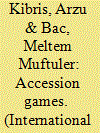

|
|
|
|
|
| Publication |
2011.
|
| Summary/Abstract |
We analyze the EU enlargement process from a rational institutionalist perspective and argue that the accession negotiations are designed to resolve the uncertainty that the existing EU members have in terms of the candidate's preferences. We model the negotiations as a Bayesian game and demonstrate how exactly the design in place helps the European Union in gathering information about the candidate country. Our model also enables us to compare alternative negotiation designs in terms of their ability to alleviate informational problems. We compare the resulting equilibrium payoffs under different negotiation designs to see whether there is any ground for a player to prefer a particular design over others. Our analysis supports the earlier arguments in the literature about the informative role of accession negotiations and demonstrates how exactly the negotiations carry out this role.
|
|
|
|
|
|
|
|
|
|
|
|
|
|
|
|
| 2 |
ID:
107985
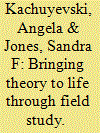

|
|
|
|
|
| Publication |
2011.
|
| Summary/Abstract |
Exercises that encourage active and direct participation by students are often seen as a way to bridge the theory of classroom learning and the outside world. While most of the attention devoted to incorporating effective active learning strategies in the international relations classroom has focused on simulations, we argue that short field studies abroad, embedded in a regular course, are an excellent tool for bringing concepts and theories studied in class to life. We developed a course on minority rights and ethnic conflict that included a one-week field study in Ukraine. Through visits to international institutions and historic, strategic, and cultural sites, students see how theories of conflict management and human and minority rights are reflected in policy. The classroom program supports and reinforces student learning by preparing them to critically analyze information they encounter while abroad. The in-country experience supports and reinforces the formal learning on campus by making the theories and historical readings more meaningful. Through short-term field studies, we argue that students are able to grasp sophisticated theoretical arguments and make the connection between theory and policy, enriching their understanding of the world in which they live. Our experience has special relevance to teaching in international affairs, as we explore how to capitalize on short-term experiences abroad to deepen and broaden student learning about the world.
|
|
|
|
|
|
|
|
|
|
|
|
|
|
|
|
| 3 |
ID:
107980
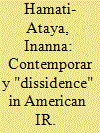

|
|
|
|
|
| Publication |
2011.
|
| Summary/Abstract |
Dissidence in IR, as in any other social field, reflects both an identity and a practice of opposition to the system. While the fact of dissidence is largely manifested in its very discursive occurrence, this article attempts to go beyond the performative nature of dissidence in order to identify the collective, common ground that unites self-acclaimed dissident scholars, to understand whether they form an objectively constituted social group, and to what extent they encompass dissidence in the field. Based on the analysis of a survey sent to American IR academics, this article shows that contemporary dissidence in American IR is structured not only by its opposition to mainstream IR, but also by internal divisions between the first generation of now established Critical dissidents, and an emerging group of Constructivist scholars who do not claim, but do practice, a clearly dissident and more marginalized scholarship.
|
|
|
|
|
|
|
|
|
|
|
|
|
|
|
|
| 4 |
ID:
107983
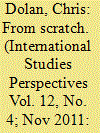

|
|
|
|
|
| Publication |
2011.
|
| Summary/Abstract |
This article advances a blueprint for small colleges interested in implementing new international studies programs. In response to a call from its strategic plan, the faculty at Lebanon Valley College (LVC) recently approved an IS program with two concentrations (international affairs and comparative culture) emphasizing core and advanced elective courses, foreign language, study abroad, as well as undergraduate research, and internship experiences. This article frames the undergraduate international studies program within the broader context of the prevailing literature and identifies the potential advantages and drawbacks of initiating and directing the major and minor. It then provides a brief discussion of the ways in which the program can be assessed and a general overview of the career opportunities available to majors. The article concludes by recommending that small colleges like LVC have the potential to prepare students for the responsibilities of global citizenship when international studies programs are designed to incorporate and maximize college-wide strengths.
|
|
|
|
|
|
|
|
|
|
|
|
|
|
|
|
| 5 |
ID:
107979
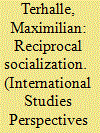

|
|
|
|
|
| Publication |
2011.
|
| Summary/Abstract |
This article asks how the international order can be renegotiated with rising powers. Negotiating understood as a process of socialization is the focus of the article. However, given non-Western states' recent practice of powerfully permeating the existing Western order, it is difficult to explain this process by means of neorealist, constructivist, or liberal socialization. Respectively, they presuppose that some states are already socialized while others need to be adopted into the club of socialized members. In contrast, this article suggests the notion of reciprocal socialization. It explains how rising powers are socialized into the order, while reshaping it when they enter. Two conditions need to be fulfilled to accomplish a socializing process that reflects the reciprocal influencing of states of the Western security community and non-Western veto-players; these are employing "small informal groups" and "personalized interactions." Their application can be viewed in informal operational rules which are, in turn, capable of governing the renegotiations.
|
|
|
|
|
|
|
|
|
|
|
|
|
|
|
|
|
|
|
|
|